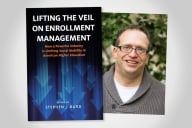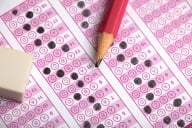You have /5 articles left.
Sign up for a free account or log in.
The American Bar Association voted Monday to reject a proposal to let law schools become test optional.
The vote by the association’s governing House of Delegates was a major victory for the producers of the Law School Admission Test and the Graduate Record Examinations, which had lobbied hard against it. This is the second time in five years that a serious effort to end standardized testing as a requirement for ABA-accredited law schools has failed.
The vote was a defeat for the Council of the ABA Section of Legal Education and Admissions to the Bar, which proposed lifting the testing requirement starting in the fall of 2025 and had argued that such a move would increase racial diversity at the nation’s law schools.
“As the debate showed, we all care deeply about diversity, we just have different views on the best way to pursue it,” Kellye Testy, president and CEO of Law School Admission Council, which produces the LSAT, said in a statement.
“The LSAT is an important tool for advancing diversity. The incoming class of 2022 is by far the most diverse class in history, and more than 98 percent of those students used the LSAT. And this year’s applicants are even more diverse than last year, which bodes well for continued progress. The House vote will ensure that we have additional time for research into the actual impact of test-optional policies on students and diversity, so that any policy changes are based on evidence and data,” she added.
Alberto Acereda, associate vice president of global higher education at the Educational Testing Service, praised the vote.
“We are pleased with the outcome of the vote by the American Bar Association’s House of Delegates today against the revisions … With this, we look forward to continuing to support law schools in their effort to recruit, retain and educate the law students of tomorrow,” he said in a statement.
ETS produces the GRE. While the LSAT for years was the only standardized test for law school admissions, the GRE is a leading alternative. So ETS and LSAC, while rivals for the business of potential law students, were united against changing the ABA rules.
Robert Schaeffer, public education director of the National Center for Fair and Open Testing, criticized the ABA’s decision.
“It appears that ABA delegates were persuaded by self-serving arguments from the Law School Admissions Council … as well as legal traditionalists who were admitted at a time when the LSAT was universally required and think that process should be permanent.”
The ABA vote may not be the last word on the issue. The ABA council that proposed the change has the authority to push the proposal through after further study. However, it is unclear if that will happen.
Sixty law deans (about one-third of the total number) had written to oppose the policy, which they said would hurt minority applicants. They wrote that the change would “diminish the diversity of law schools’ incoming classes, by increasing reliance on grade point average and other criteria that are potentially more infused with bias. At the very least, we believe that more data and study on the effects of this precipitous change are needed.”
The deans added, “For if law schools abandon the LSAT (or some other validated test) in their admissions processes, something else will take its place. We do not know what those things will be, but it is quite possible—we think probable—that greater emphasis will be put on GPA, written or verbal recommendations, the reputation of undergraduate institutions, admissions officers’ familiarity with those institutions, or other subjective factors. Will reliance on these other criteria produce more or less racial, socioeconomic, or other forms of bias than exist under current admissions practices?”
Amit Schlesinger, executive director of legal programs at the test-prep company Kaplan, said, “This is not the first time the American Bar Association came really close to adopting a rules change on the standardized test requirement before pulling back at the last moment. Considering the potential significance this rule change would have had on the law school admissions landscape and its impact on aspiring lawyers, it’s understandable why it was not successful at this time, though it’s clear there is a wide variety of opinions and it may be revisited.”
As part of Kaplan’s 2022 law school admissions officers survey, in anticipation of this change, the company asked law schools what they might decide to do if the requirement were no longer in place. Of the 82 ABA-approved law schools that were surveyed in September and October:
- Thirty said their school would be very likely to continue requiring applicants to take an admissions exam.
- Eleven said their school would be somewhat likely to continue requiring applicants to take an admissions exam.
- Two said their school would be somewhat unlikely to continue requiring applicants to take an admissions exam.
- Two said their school would be very unlikely to continue requiring applicants to take an admissions exam.
- And the remaining 37 didn’t know what their school would do.
Said Schlesinger: “Ultimately, we believe that most law schools would still have kept a testing requirement in place, for a few major reasons, including its ability to act as a control mechanism by helping them identify who may or may not succeed in their program and pass the bar exam; its potentially harmful impact on diversity efforts, by forcing them to rely more heavily on less standardized and more subjective factors; and the potential impact it could have on their place in the rankings, although some top law schools have recently withdrawn from that process.”








